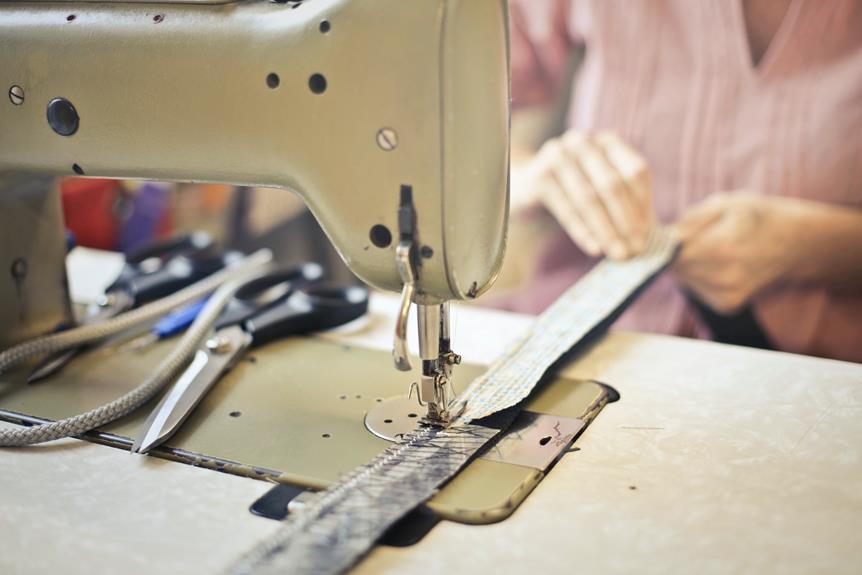Are industrial sewing machines essential for working with fabrics?
The textile industry, which generates over $2.5 trillion in revenue annually, heavily relies on the efficiency and precision of industrial sewing machines. These powerful machines offer a myriad of benefits, from handling a wide range of fabrics to significantly increasing productivity.
Understanding the role of industrial sewing machines in fabric work is crucial for mastering the art of textile production. In this exploration, we will delve into the necessity of industrial sewing machines, the types of fabrics that best suit these machines, cost considerations, and the impact they have on the quality of the final product.
Whether you're a seasoned professional or an aspiring textile specialist, grasping the significance of industrial sewing machines is key to achieving mastery in fabric work.
Key Takeaways
- Industrial sewing machines significantly increase productivity.
- They are well-suited for heavy-duty fabrics like denim, canvas, and leather.
- Industrial sewing machines have high-speed production capabilities.
- They offer long-term benefits, ensuring durability and longevity.
Benefits of Industrial Sewing Machines
Why are industrial sewing machines essential for you when working with fabrics?
Industrial sewing machines offer numerous benefits that can significantly improve your efficiency and productivity. One of the key advantages is the significant time-saving capability they provide. These machines are designed to handle large volumes of work at a much faster pace than traditional sewing machines, allowing you to complete projects in a fraction of the time.
In addition to time savings, industrial sewing machines can also lead to substantial cost savings in the long run. While they may require a higher initial investment, their durability and ability to handle heavy-duty tasks make them a cost-effective choice for those working with fabrics regularly. Moreover, their efficiency improvement can lead to increased output and, consequently, higher revenues.
Despite their advanced features, industrial sewing machines don't necessarily require extensive training to operate. Many models are designed with user-friendly interfaces, making them accessible to individuals with varying levels of experience. This means that you can quickly adapt to using an industrial sewing machine without extensive training requirements, further contributing to your overall efficiency and productivity.
Types of Fabrics Suitable for Industrial Sewing Machines
When working with industrial sewing machines, you'll find that they're well-suited for heavy-duty fabrics like denim, canvas, and leather due to their robust construction and powerful stitching capabilities.
Additionally, these machines are designed for high-speed sewing, making them ideal for handling large volumes of fabric quickly and efficiently.
Moreover, industrial sewing machines offer versatility in fabric options, allowing you to work with a wide range of materials including lightweight and stretch fabrics.
Heavy-Duty Fabrics Compatibility
Can industrial sewing machines effectively handle heavy-duty fabrics such as canvas and denim?
When it comes to heavy-duty sewing, industrial machines are well-equipped to handle a wide range of tough fabrics. Here are a few types of heavy-duty fabrics that are compatible with industrial sewing machines:
- Canvas: Industrial sewing machines are designed to effortlessly stitch through thick canvas materials, making them ideal for heavy-duty projects such as tote bags, tents, and upholstery.
- Denim: With their robust motors and heavy-duty needles, industrial sewing machines can easily sew through multiple layers of denim, making them perfect for crafting durable jeans, jackets, and denim accessories.
- Upholstery Fabrics: These heavy, thick fabrics require a powerful sewing machine, and industrial models are well-suited for creating sturdy upholstered furniture and automotive interiors.
High-Speed Sewing Capabilities
To effectively work with a variety of fabrics using industrial sewing machines, you need to understand their high-speed sewing capabilities and the types of fabrics they are suitable for. Industrial sewing technology allows for high-speed production, making it essential to select fabrics that can withstand the rapid stitching without compromising on quality. Here's a table outlining the types of fabrics suitable for industrial sewing machines:
| Fabric Type | Description | Suitable for |
|---|---|---|
| Denim | Thick, durable fabric used for jeans and workwear | Heavy-duty sewing, such as in garment factories |
| Canvas | Sturdy, heavyweight fabric used for bags and tents | Ideal for heavy-duty products and accessories |
| Nylon | Strong, synthetic fabric used for activewear | Well-suited for sportswear and outdoor gear |
Understanding the high-speed sewing capabilities and suitable fabrics for industrial sewing machines is crucial for achieving efficient and high-quality production.
Versatility in Fabric Options
To achieve efficient and high-quality production with industrial sewing machines, you must consider a wide range of fabric options suitable for various sewing applications. Industrial sewing machines are designed to handle a diverse array of fabrics, offering versatility and durability for heavy-duty sewing tasks.
When choosing fabric options for industrial sewing machines, consider the following:
- Denim: Known for its durability and strength, denim is a popular choice for industrial sewing machines, especially for tasks like stitching jeans, jackets, and heavy-duty workwear.
- Canvas: With its sturdy and robust nature, canvas is well-suited for industrial sewing machines, making it ideal for products like bags, tents, and outdoor equipment.
- Upholstery Fabrics: Industrial sewing machines can effortlessly handle thick upholstery fabrics, making them suitable for crafting furniture, automotive interiors, and other heavy-duty upholstery projects.
Cost Considerations for Industrial Sewing Machines
Considering the initial cost, maintenance, and operational expenses, industrial sewing machines can be a significant investment for your fabric-related business. However, they offer long-term benefits, making them a cost-efficient choice.
While the initial cost of industrial sewing machines may seem high, they're designed for heavy-duty use, ensuring durability and longevity. This makes them a long-term investment that can save you money in the future, as they're less likely to require frequent replacement or repairs compared to domestic sewing machines when used in a commercial setting.
When evaluating the cost of industrial sewing machines, it's essential to consider the overall cost efficiency they bring to your business. These machines are built to handle a wide variety of fabrics, increasing your efficiency and productivity. Additionally, their speed and precision contribute to reducing labor costs in the long run.
Moreover, the availability of industrial sewing machine parts and the option of refurbishing or upgrading components can further extend their lifespan, making them a sustainable investment for your business.
Therefore, while the initial outlay may be substantial, the long-term benefits and cost efficiencies make industrial sewing machines a worthwhile investment for your fabric-related operations.
Differences Between Industrial and Domestic Sewing Machines
When considering the differences between industrial and domestic sewing machines, it's important to note that industrial machines are designed for speed and durability, making them ideal for heavy-duty projects.
Additionally, industrial machines offer a larger workspace and more power compared to domestic machines, allowing for the handling of larger and thicker fabrics.
These factors contribute to the specialized nature of industrial sewing machines, catering to the needs of professional garment makers and manufacturers.
Speed and Durability
With industrial sewing machines, you can achieve higher speed and greater durability compared to domestic machines. Industrial machines are designed for heavy-duty use and are built to withstand long hours of continuous operation.
Here are three key differences in speed and durability between industrial and domestic sewing machines:
- High Speed: Industrial machines are capable of stitching at a much higher speed than domestic machines, making them ideal for large-scale production and saving valuable time.
- Greater Durability: Industrial machines are constructed with more robust materials and components, ensuring prolonged use without frequent maintenance or repairs.
- Consistent Precision: Industrial machines are engineered for precise stitching and consistent results, contributing to the overall durability of the machine and the quality of the finished products.
These features make industrial sewing machines essential for professionals seeking efficiency and reliability in their fabric work.
Specialized for Heavy-Duty
For heavy-duty fabric work, industrial sewing machines excel in their specialized capabilities compared to domestic machines.
Industrial sewing machines are designed for heavy-duty sewing tasks, handling thick and tough materials with ease. They're equipped with powerful motors and sturdy construction, allowing them to effortlessly stitch through multiple layers of heavy fabrics, such as denim, canvas, and leather.
The industrial sewing techniques employed by these machines, including specialized needle systems and high presser foot lift, ensure precise and consistent stitching on heavy materials.
In contrast, domestic sewing machines may struggle with such demanding tasks due to their lighter construction and less powerful motors.
If you frequently work with heavy-duty fabrics or require industrial sewing techniques, investing in an industrial sewing machine is essential for achieving professional results.
Larger Workspace and Power
In the realm of sewing, the difference in workspace and power between industrial and domestic machines significantly impacts the efficiency and versatility of fabric work.
Industrial sewing machines offer larger workspaces, allowing for easier manipulation of larger and thicker fabrics. This is especially advantageous when working on upholstery, drapery, or other bulky projects.
Moreover, industrial machines are designed for high-power requirements, enabling them to handle heavy-duty materials with ease. They're equipped with powerful motors that can sew through multiple layers of fabric and even leather. This makes industrial machines indispensable for tasks that demand precision and strength.
However, domestic sewing machines, while suitable for lighter projects, may struggle with larger workloads due to their smaller workspaces and lower power capabilities.
Productivity and Efficiency With Industrial Sewing Machines
To maximize productivity and efficiency with industrial sewing machines, you need to focus on optimizing workflow and utilizing time-saving features.
Industrial sewing machines offer significant productivity advantages due to their high-speed stitching capabilities and the ability to handle heavy-duty fabrics with ease.
To ensure consistent productivity, regular machine maintenance is crucial. This includes cleaning, oiling, and timely replacement of worn-out parts.
Additionally, familiarizing yourself with the specific features of your industrial sewing machine can greatly enhance efficiency. Understanding the different stitching options, automatic thread trimming, and needle positioning capabilities can help streamline your workflow and save valuable time.
Furthermore, organizing your work area to minimize unnecessary movements and having a well-thought-out production plan can significantly boost your overall productivity.
Maintenance and Care for Industrial Sewing Machines
You should regularly carry out maintenance and care for your industrial sewing machine to ensure optimal performance and longevity. Here are some maintenance tips, troubleshooting techniques, safety precautions, and equipment upgrades to consider:
- Regular Cleaning: Keep your industrial sewing machine clean by removing lint, dust, and debris. Use a soft brush, lint roller, or vacuum attachment to clean the bobbin case, feed dogs, and other components. Regular cleaning prevents build-up and ensures smooth operation.
- Oil and Lubrication: Proper lubrication is crucial for the smooth functioning of industrial sewing machines. Follow the manufacturer's guidelines to oil the moving parts and components. This helps reduce friction, wear, and tear, extending the machine's lifespan.
- Tension Adjustment: Periodically check and adjust the thread tension to ensure even and balanced stitches. Improper tension can lead to thread breakage, uneven seams, and other sewing issues. Understanding the correct tension settings for different fabrics and threads is essential for quality stitching.
By following these maintenance tips and implementing safety precautions, you can optimize the performance of your industrial sewing machine.
Additionally, consider equipment upgrades such as installing LED lights for better visibility or replacing worn-out parts to maintain efficiency.
The Impact of Industrial Sewing Machines on Quality
Maximize the quality of your fabric products by leveraging the precision and efficiency of industrial sewing machines. These machines are designed to handle various fabric handling techniques with accuracy, resulting in high-quality, professional-looking finished products.
The impact on efficiency is substantial when using industrial sewing machines. The speed and precision of these machines ensure consistent and even stitching, which is crucial for the quality of your fabric products.
The impact on efficiency also extends to the overall production process, allowing for faster turnaround times without compromising on quality. Moreover, industrial sewing machines contribute to the durability and strength of the seams, reducing the likelihood of fraying or unraveling.
This, in turn, enhances the overall quality and longevity of your fabric products. By incorporating these machines into your workflow, you can elevate the quality of your fabric products and meet the high standards expected in the industry.
Frequently Asked Questions
Can Industrial Sewing Machines Be Used for Embroidery and Decorative Stitching on Fabrics?
Yes, industrial sewing machines can be used for embroidery and offer a range of decorative stitching options. They provide precise embroidery capabilities and a variety of decorative stitches, making them essential for intricate fabric work.
Are There Specific Safety Considerations When Using Industrial Sewing Machines Compared to Domestic Machines?
When using industrial sewing machines, safety precautions are crucial. Regular equipment maintenance and adherence to industry standards are essential. Training programs can help you master safe operation and prevent workplace accidents.
What Are Some Common Challenges or Issues That May Arise When Using Industrial Sewing Machines?
When using industrial sewing machines, maintenance tips are crucial for optimal performance. Troubleshooting speed and precision issues may arise, but regular oiling and cleaning can help. Stay mindful of tension adjustments for smooth sewing.
How Do Industrial Sewing Machines Impact the Environment and Sustainability Compared to Domestic Machines?
When it comes to industrial sewing machines, their environmental impact is significant. Compared to domestic machines, they generally consume more energy and resources. Sustainability practices are crucial in this context to minimize their ecological footprint.
Are There Any Regulations or Certifications Required for Operating Industrial Sewing Machines in a Professional Setting?
In a professional setting, operating industrial sewing machines may require certifications and compliance with regulations. These measures ensure safety, quality, and adherence to industry standards. Familiarize yourself with these requirements to excel in your craft.
- What Is the Difference Between Organza and Organza Silk? - April 23, 2024
- What Are the Pros and Cons of Organza Fabric? - April 23, 2024
- Is Organza Costly? - April 23, 2024





